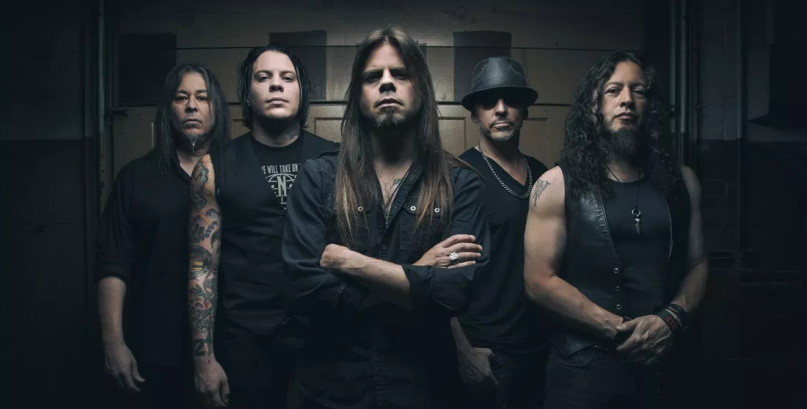My success as a sketch artist peaked in high school. I had two reliable audiences that looked to me for work, and if they’d actually paid me, I’d be a rich man now. I had the metalheads and the horny high school dudes. The latter would say, “Draw me sexy women!” Their one critique would invariably be, “No, make ’em bigger!”
The metalheads, on the other hand, were looking for art for their cassette demos, and upon receipt of the work, typically responded, “No, make it more evil!”
Ultimately, what keeps Queensryche’s third album from truly breaking through is that same issue. Reenergized by vocalist Todd LaTorre in his third outing (and first as drummer, but more on that momentarily), The Verdict has got the mechanics down right. There’s no denying that. The execution, on the other hand…
At this stage, it’s impossible to put the record into context without minimally touching upon the soap opera that is Queensryche. They started with the uber-metal The Warning in 1984, and showed an inherent ability to bend to the times with 1986’s Rage For Order. After that, the band had a remarkable three-album streak, at least for this pundit: 1988’s Operation: Mindcrime, 1990’s breakout Empire, and 1994’s Promised Land. That last one’s going to cause a few noses to wrinkle. “You mean the grunge Queensryche album?” Sorry, but Promised Land has aged remarkably well, and in retrospect, the worst you can say about it is that it can seem like Empire Part 2. If that’s the crime you’re committing, you’re not doing something all that wrong.

It’s the next few years that really caused the Queensryche brand to drop from favor as the band moved herky-jerky from poppier sounds to sludge to a few degrees before nu-metal, but not by much. I maintain that these stylistic shifts would not have mattered if the songs, in their basic essence, were there. They weren’t. Only 2009’s American Soldier shone through as conceptual, song-driven effort, while the rest of the albums between 1997-2011 came across as needy, wanting to be whatever was in vogue at the moment.
By 2013, we had two Queensryches, one with departing longtime vocalist Geoff Tate, and the other with the remaining members of the band. Conflicts and confusing bandname ownership overlaps ensued. Eventually Tate changed his band entity to Operation: Mindcrime, which is only slightly more helpful.
LaTorre’s Queensryche is most decidedly a metal band, and has been embraced as such. My initial reaction to 2013’s Queensryche, his first, was not warm but I’ve softened on it considerably. Since then, however, the band has made the doubling-down on the “we are metal!” thing their guiding principle. 2015’s Condition Hüman, umlaut over the “U” and all, merely feeds that fire.
The mandate for The Verdict? “No, make it more evil!” That’s what we now have, with a bunch of hard-chugging thrashers frontloading the disc, and moody titles like “Blood of the Levant,” “Dark Reverie,” “Inner Unrest,” and “Launder the Conscience” throughout. The cover, depicting a blood-red reaper summoning a tri-ryche scale (which, in the interior is weighing skulls, because “subtlety”), and lyrics such as “Propaganda Fashion’s” “System (no communication), Broken (poisoned motherf***ers)” all come off with the stink of overcompensation.
And the worst part about it all? Aside from the added ridiculousness, this record contains some of the best Queensryche songs (all versions of Queensryche) in years. The back half of the album recalls that this once was a highly regarded hard rock force to be reckoned with, and all the high school horror-fest goop and tuff-talk was unnecessary.
This is the first album without drummer Scott Rockenfield who, more than a year ago, took temporary leave of the band to be a new father, and subsequently cut ties with the band. Some reports go as far to say that he completely ghosted the band, in fact, leaving them no other choice but to find a new drummer, and that eventually became LaTorre as well. (As this melodrama continues, I would not be surprised to see Rockenfield upping with Tate’s Operation: Mindcrime.)
This album will do extremely well with metal fans. All three LaTorre albums have. I hate to throw stones at a single fan base, but there’s an awful lot of empirical evidence showing that, to keep a lot of metalheads happy, the music just has to be heavy (re: “evil”). The trappings of The Verdict act as signals. What will get lost in the semaphore is that, aside from occasional cheeseball “throwing up of the horns,” the songs are really there, the band’s longstanding social conscience is intact, they still can wring melody from buzzsaw guitars, and sure, LaTorre regularly can out-Tate Geoff Tate.
Critics are forced to say it: the verdict on The Verdict (groan) is that it is worth your time. It stands as the best of this (mostly) latest iteration, and if there’s something sad about the whole it is that the extraneous spooky costuming is unnecessary and suggests a band which, even when it strikes gold, still lacks the self-esteem to claim it.